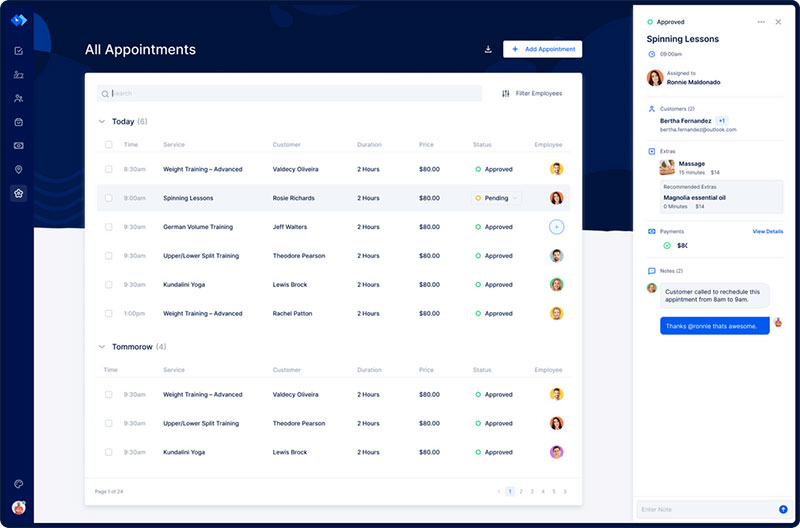The real estate industry is a challenging one. Prices of properties are high and clients always want a photo shoot that will capture the most appealing characteristics of the property.
Every real estate photography client has different experiences, expectations, and goals, and this is an important aspect to consider.
If you are looking to become a professional real estate photographer it is important you establish a clear set of conditions to be agreed upon with the client in advance. For this reason, we recommend writing a real estate photography contract that will consider the needs of the client as well as the photographer´s responsibilities and rights.
Writing a strong real estate photography contract will help you protect your business and improve your reputation before clients. It is also the best way to set up the conditions of the real estate photo session, the deliverables, payment time frames, and budget.
This article presents recommendations to consider when creating real estate photography contracts.
The importance of having a real estate photography contract

Many real estate photographers, or photographers in general, may think that drafting a contract or a photography proposal is a waste of time. However, it is the opposite.
What would happen if the client does not pay you on time? What if they decide to change terms in the middle of the work process? What if they demand an earlier delivery?
These issues will be well covered if there is a professional real estate photography contract. This legal document will stipulate responsibilities and rights for both parties. The contract should also clearly set up the deliverables, time frames, and payments.
Thus, having a contract will save you time instead of wasting it. It may be challenging at first but it is an investment that may save you from future troubles. Moreover, you can prepare standard contract templates for all clients and only edit details for each photography session.
Real estate photography contracts also help improve your reputation as a photographer and build a strong relationship with your clients, realtors, or property owners.
A real estate photography contract may be useful for the following:
- Show your work process to your clients
- Establish payment terms and conditions
- Discuss photo ownership
- Set up your responsibilities and explain what customers should expect from you
- Describe what you will need from your clients
- Set up your cancellation policies and rescheduling conditions
Protect yourself with a real estate photography contract
At this point, you may ask: what do I need protection from, and is it really worth it? It might seem that the effort of putting together and signing an agreement may not be worth it for just a couple of hundred dollars.
If the revenue for a photography shoot is relatively low, you may want to skip the contract and take the risk yourself. If the client doesn’t pay you, you simply don’t release the photos, or engage with this customer any further until the accounts are settled.
With this approach, however, you will be limited to low-budget projects. If you want to grow your income and accept further challenges with higher revenue, then a real estate photography contract is highly recommended.
There are many instances where an agreement is not only advisable but necessary.
Commercial real estate photography
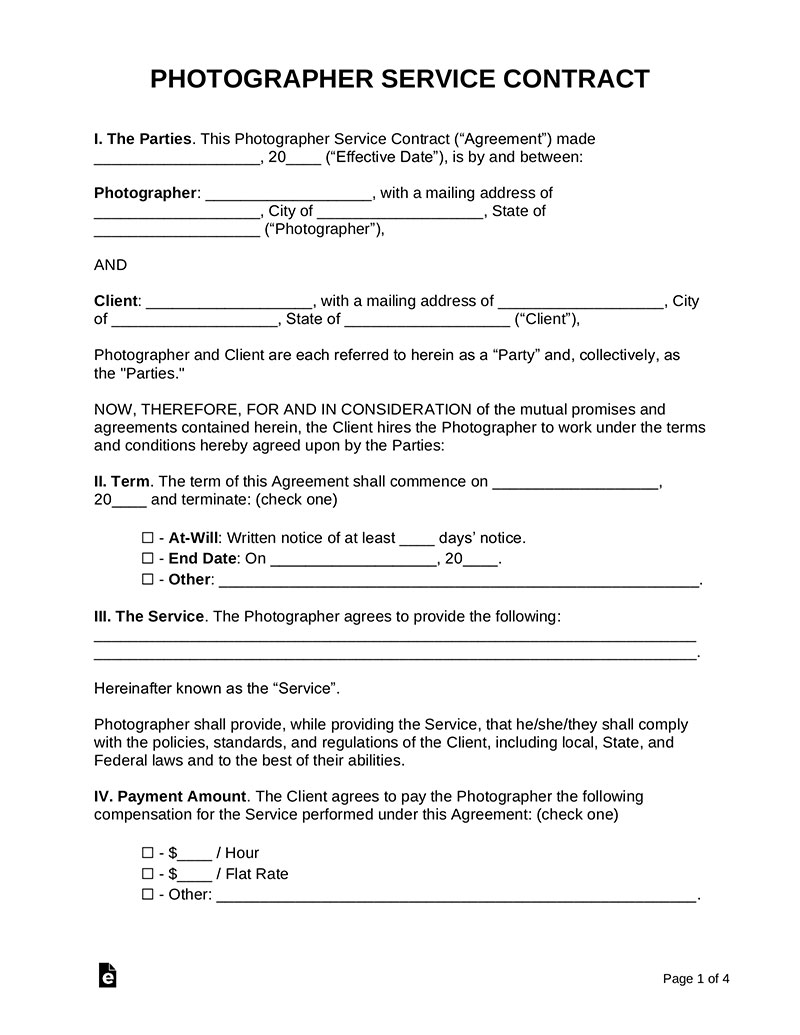
Photographers dedicated to commercial photography usually get higher revenue, such as restaurants, shops, and hotels. This kind of work demands images of higher quality and more responsibility from the photographer.
These types of photos are used for advertising, websites, brochures, and property listing. For this reason, it is important to draft an agreement establishing payments, canceling policies, terms and conditions, and rights to using the images.
Due to the responsibility involved and the possibility of higher revenue, it is very important to establish a contract for commercial real estate photography projects.
Portfolio building
This type of job also brings a higher revenue than regular real estate photo shoots. This is because you are contributing to your client's portfolio. Your photos will be used for advertising and continued marketing of somebody´s business. In this case, your clients may be real estate agents, designers, contractors, or builders.
It is important to establish your work´s scope of usage. Your photos may be used in the long term and published in magazines, newspapers, websites, journals. You probably do not want your photography work to be published without fair compensation.
Exclusivity and retainer contracts
When a large real estate agency or broker wants you to work exclusively for them, then a contract becomes necessary.
The agreement should clearly stipulate: how long will the photographer work exclusively for the contractor? How much work will the photographer receive to remain exclusive? These types of contracts are usually offered to real estate photographers to shoot in a specific area exclusively.
A real estate photographer can also work as a retainer. In this case, the contractor pays an amount of money in advance for the person to be available at a required time. The professional will deliver a determined amount of work.
Thus, a contract becomes necessary to stipulate various factors. How long will the retainer contract last? What happens when the photographer does not receive any tasks? For example, under a retainer arrangement, brokers can request photographers to set apart one day of the week to work only for them.
With retainer and exclusivity contracts, a formal agreement becomes vital to avoid possible issues in the future.
Avoid potential problems
Even though the terms and conditions of a contract may be agreed verbally, agents or contractors may forget them. In this situation, having a written contract as a backup is vital.
However, some cases may not require a contract, especially when you have been working with a client for a long time. If the photographer already knows and trusts the client and vice versa, then a verbal arrangement presents little risk.
However, for new customers, a real estate photography contract is a good idea. At first, they will probably be reluctant to sign it. You should explain to them that the contract is a mere formality and a precautionary measure to protect both parties.
What terms to include in your photography contract
In general, a contract should establish the responsibilities and rights of the parties involved. These can be photographers, realtors, builders, construction companies, agents, home sellers, and others.
A well-drafted contract establishes the duties of the photographer and the client and what happens if any of the parties does not fulfill those duties.
The following information describes the main clauses of a real estate photography contract that will help bring transparency to the whole working process. Useful tips are also provided that will enable you to create a well-written legal document.
Information
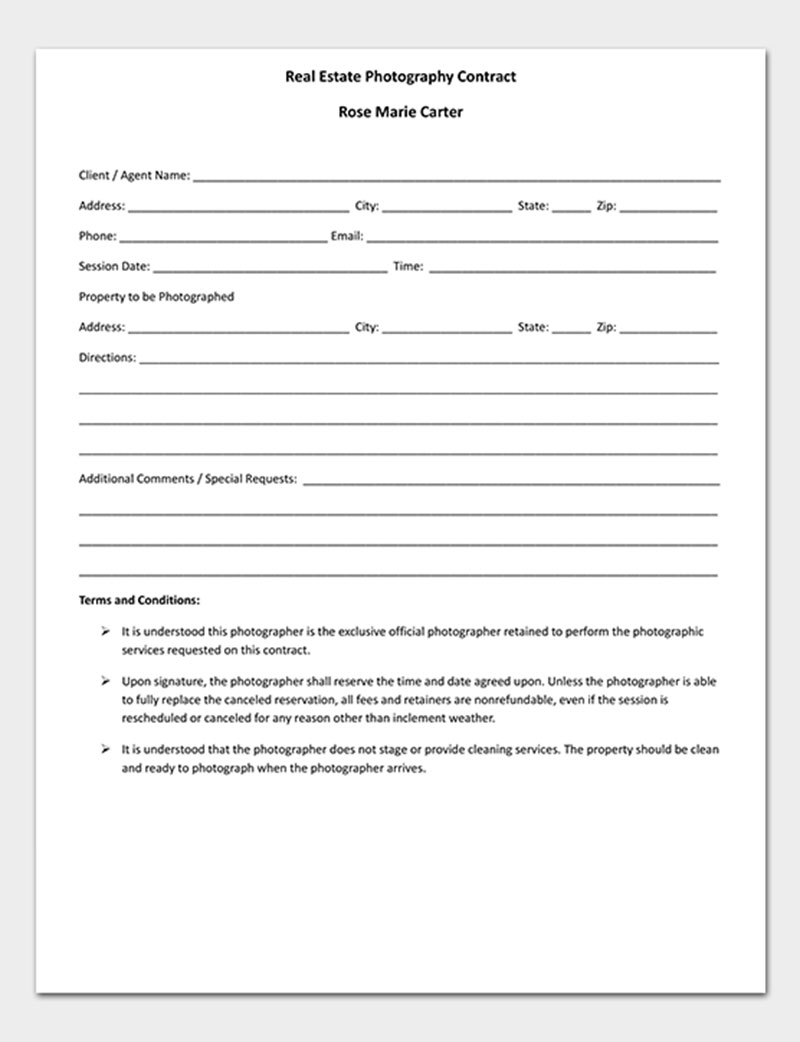
This section should provide detailed information about the photographer and the client, This includes at least the full name, address, and ID. For companies, it includes name, registered address, mailing address, incorporation number, contact person, etc.
Although some professionals tend to overlook this, information is key to a well-drafted real estate photography contract. The mailing address and contact person are important in case the photographer needs to deliver something to the client or if they need to visit the photography studio.
Scope of the project
This is the key section of any contract. Here the photographer will set out his/her tasks, time frames, etc. It is necessary to describe services as thoroughly as possible and to state exact deadlines, numbers, quantity, and quality of the offered services. This becomes vital in order to avoid misunderstandings.
It is recommended to also state the address of the object to photograph and the code of the property if applicable.
Main factors to be included in your real estate photography contract:
- Particular requests from the client
- Amount of photos to be delivered
- Services included (photo editing, retouching, staging, twilight shooting, drone shooting, etc.)
- Scheduled date and duration of the photo shoot
Payment terms
The payment terms must be agreed upon in advance by both parties. The client can pay the photographer in cash at the time of the photo session or by credit card or bank transfer beforehand. Sometimes, the payment can be done when the photographer delivers the photos.
If the photographer asks for the full payment at the end of the photo session, some risk is possible, especially if you are dealing with a new and unfamiliar client.
One usual condition is that, if the client does not pay in 30 days, the rights granted by the contract become invalid. An interesting approach is submitting low-quality versions of the photos with watermarks for review. When the client makes the payment, the photographer releases the full-quality versions.
You would be sending a preview of the pictures first and the ready-to-use versions once payment is complete. This is one of the best ways for photographers to protect their work and secure their income.
Optional payment terms that you can include in your real estate photography contract:
- Ask for a downpayment (a percentage of the full price) 14 days in advance to secure the booking
- Payment methods accepted (cash, credit card, debit card, bank transfer)
- International payments or virtual wallets accepted (PayPal, international wires, Payoneer)
- Process and conditions for cancellation, rescheduling, or refund
- Payment time frame
- Option to pay the rest of the fee before obtaining the edited photos
Requirements
The success of the photo shoot does not only depend on the photographer, but also the property styling and preparation. Getting the property interior ready and beautiful for the photography session is the client’s responsibility. Make sure that this is clearly stated in the contract.
Here are some basic tips that photographers can suggest to their clients when preparing the interior. You can make your own suggestions as well.
Prepare a property interior for a real estate photography session:
- Clean all the rooms and put the furniture in the right place
- Remove personal items
- Make sure the swimming pool is clean
- Clean the garden or yard. Cut the lawn. For luxury properties with large parks, you can recommend hiring a gardener before the photography session
- Prepare the beds in an appealing way
- Set up the table accurately with fine china or a fancy base
Before a shoot, photographers need only a quick revision and walkthrough. It does not make sense to waste a day´s work in styling, cleaning, and organizing the property´s interior.
Sometimes, photography sessions can be canceled due to factors beyond your control, like renovations or unforeseen events. Your contract can stipulate that, if the property is not ready on the scheduled day, you will receive full payment even if you reschedule.
Extra fees
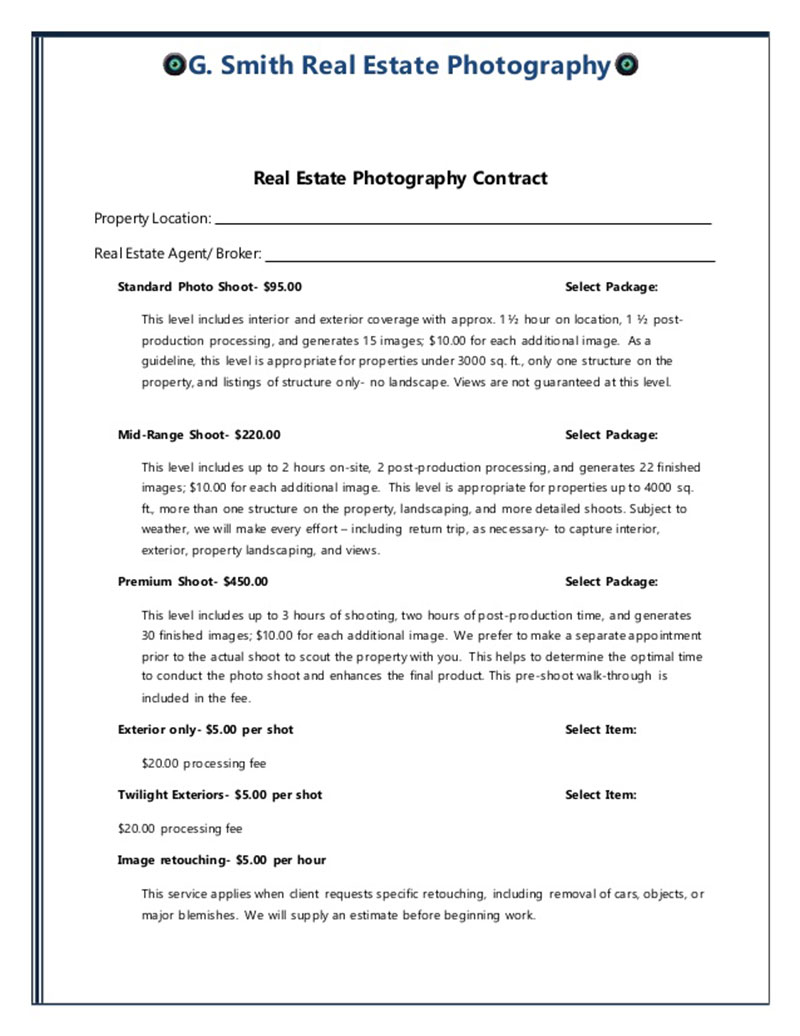
When conducting a real estate photography session, there might be extra expenses. Include these potential expenses in your fee as much as possible. In any case, you can also establish possible extra fees in your contract.
Some of these extra expenses may include:
- Cost of printed versions of the photos, especially if you usually deliver web images.
- Travel expenses. These can be charged through a flat fee or you can ask for a refund.
- Cost for extra production. This can be advanced photo editing like object removal or sky replacement.
- Cost for extra photos in case the client decides to create additional photos during the working process.
When drafting your agreement, it is important to stipulate these fees. The client should understand that any extra requirement will generate an extra cost.
Sometimes, it is a good idea to overdeliver, i.e., to submit 5-10% more than previously agreed. This will keep your customers happy and will give them the sensation that they got more than what they paid for. Organize your time and tasks so that this does not require extra effort from you. It is important you properly balance your time/retribution ratio to generate more profit or to enjoy free time.
Get more bookings with the right tool for the job
Staying organized has never been easier.
You can now manage your business and grow your brand with a single, powerful software that keeps all of your appointments in line, your clients organized and your business booming.
Trafft is the perfect service scheduling software for business owners who need to streamline their booking experience both for their staff and their clients.
Trafft handles everything for you, even sending automated email or SMS reminders to your clients. No-shows? Not anymore!
The Trafft booking software adapts to different industries for a blissful online booking experience and employee management.
Want to know more? Check out Trafft's awesome features to see what you are missing.
Personal photography preferences
Most clients have personal preferences when hiring a real estate photography service. These must be discussed in advance and stated in the agreement as accurately as possible.
These preferences can vary between lightning, effects, angles, and others. If the client does not have any preferences, you can arrange your photography session according to your own experience and criteria.
Deliverables
For a successful photography session, it is very important to set up the deliverables in advance. Without this, clients can expect something different than what photographers deliver. This obviously leads to frustration, a waste of time from redoing the tasks, and probably even loss of the client.
A good photography contract must stipulate the form of the deliverables: what will be submitted and in what form and time.
Useful tips for setting up the deliverables:
- Number of revisions included in the fee
- Exact date for the delivery of the files or printed copies
- Release the material for review before payment (water-marked or low-quality version)
- MLS photo size
- Use of cloud storage services such as Dropbox, One Drive, etc.
- Establish the image resolution and aspect ratio for the photos to be used on the client’s website, brochures, etc.
- Format of the files (JPG, RAW, etc.)
- Amount of agent profiles or shots that may require editing
Sometimes, the after process can be even more challenging than the photography session itself. That is why we recommend establishing realistic deadlines in order to avoid disappointment and demands.
Cancellation policies
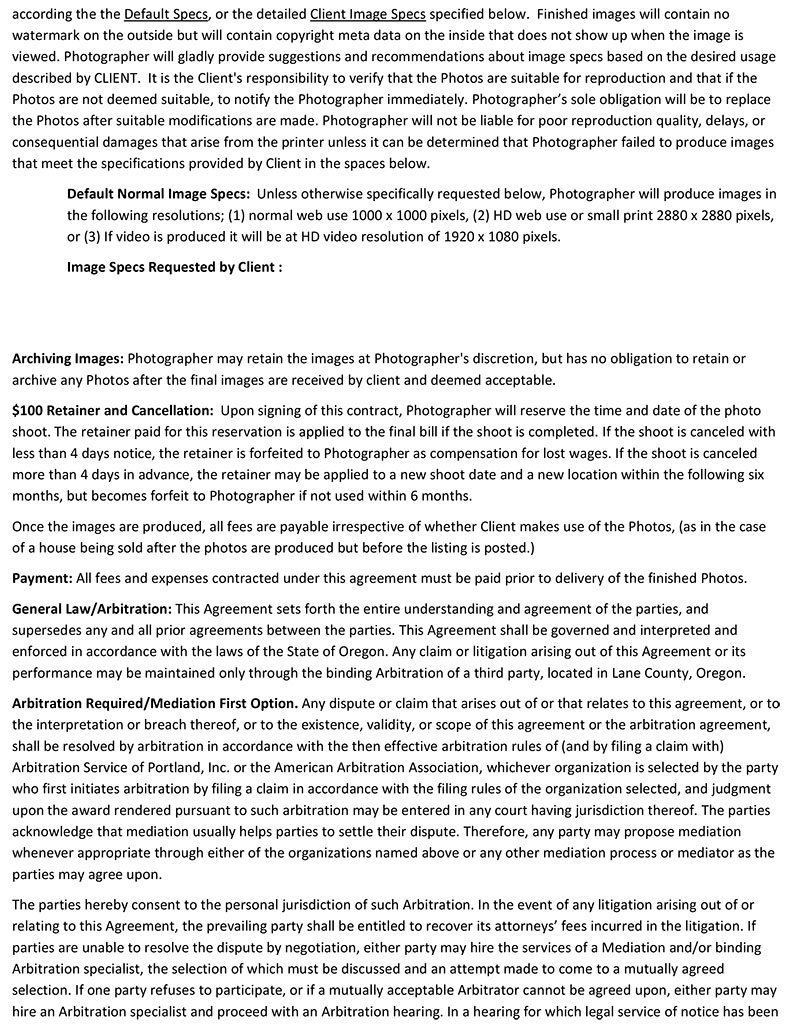
When you start a photography contract you will want to carry it through smoothly. However, we can’t always predict what will happen and these contingencies should be considered in your photography contract. Some of these factors may be uncomfortable to discuss with a client when embarking on a new project. However, it would be much more uncomfortable to have to deal with these issues at a later stage, without a previous discussion of the matter.
Your agreement should account for the following possibilities:
Canceling the photography session
If you are forced to cancel the shoot, make sure you offer your client an alternative. If an unpleasant event should occur, like a family emergency, an accident, or even if your camera breaks, set up the compensations that your client will receive. This needs to be previously stated.
Reschedule the photography session
Indicate if the client will incur any fine if they need a reschedule or early delivery.
Late arrival to the property
When shooting a real estate photography session, the photographer and the crew cannot enter the property without the owner or client. Make sure to stipulate that you will be reimbursed for your time in case of late arrival from the client.
Provision of equipment and real estate property
This section of the contract stipulates what kind of equipment will be used during the photography session. This includes hardware and software. Like with any other section of the contract, it is important that the customer understands what to expect.
This section will help you avoid uncomfortable situations. For example, real estate agents may be used to photographing small condos using a wide-angle lens. They may expect you to have this as part of your equipment.
Agreeing and establishing the equipment in advance with the other party is a smart move that will help make the shooting process smoother.
Your equipment list may include:
- Cameras that will be used during the photography session
- Lenses to be used and that will be available the day of the session
- Lighting equipment or staging objects
- Editing and post-editing software
Intellectual rights
This is an important aspect that generally creates confusion and misunderstanding. Many clients assume that, after you send them the edited pictures, they own the intellectual rights.
However, in some cases, it is possible to stipulate that the pictures can be used for the previously agreed purposes. Otherwise, the client would be incurring copyright infringement. Usage of the images in any other context would need a license agreement.
It is very important that all photography contracts state who retains copyright of the images. In some cases, the photographer can retain the rights but authorize the clients to use the images.
Usually, the photographer grants a license for unlimited use of the photos on websites, but limited use for printed material.
Property release
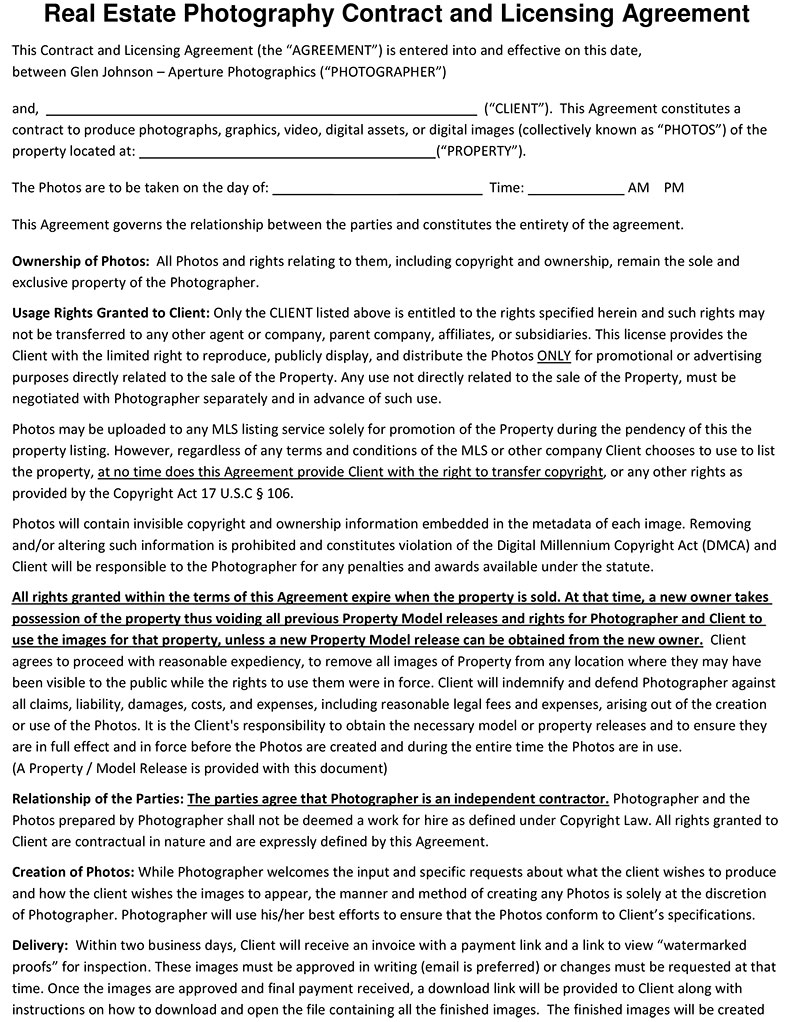
This is one of the most misunderstood areas in the real estate photography business. For this reason, we strongly recommend establishing the license covered by the project.
Here we present some tips that will help you outline your project´s license:
- Hosting of the location where the professional works
- Frequency of usage of the images
- How long can the photos be used until a license renovation is required
It is important that you are the only authorized person to make copies of the photos or the portfolio. This includes websites, real estate exhibitions, competitions, property listing, marketing materials, etc.
Also, include architectural image rights, usage conditions, and the consequences that clients will face if they infringe the terms of the contract.
Confidentiality
A photography professional needs to protect the client's confidentiality. Before you start to shoot, make sure that all objects that may disclose the client's identity are removed.
This includes pictures of the family, the property owner, personal items, documents, etc. Thus, the images will capture the character of the home and not of the clients.
Also, make sure you get permission from the owners to use the images in other contexts: promoting your services, your website, contests, etc.
Signing the contract

All agreements become effective after each party has signed. We recommend making a copy for each client and professional involved.
If you want a higher level of protection, you can ask the client to mark each page with his/her initials. This adds extra protection because the client acknowledges having read and understood the terms on each page.
It is also possible to sign a contract electronically using special software. Hello Sign and DocuSign are some of the programs that allow for virtual signatures.
FAQs about real estate photography contracts
1. What is included in a real estate photography contract?
The scope of the project, the number of images to be taken, the deadline for completion, the conditions of payment, and any other services or add-ons that the photographer may provide are typical components of a real estate photography contract.
2. How long does a typical real estate photography contract last?
The complexity of the project, the number of homes being photographed, and the photographer's availability can all affect how long a real estate photography contract lasts. Contracts might be for one-day photoshoots or recurring work that lasts for months or years.
3. Who owns the rights to the photos taken under the contract?
Often, a real estate photography contract specifies who will own the images shot as part of the agreement. Most of the time, the photographer gives the client permission to use the images for marketing and promotional purposes while keeping the copyright to the images.
4. What is the cost of a real estate photography contract?
A real estate photography contract's price can change based on the photographer's experience, the project's size, and the property's location. While some photographers have set prices for their services, others may bill by the hour or by the image.
5. Are there any additional fees or charges that might apply?
Travel costs, rush fees for quick turnaround times, and fees for other services like virtual staging or editing could all be added to a real estate photography contract as additional fees or charges.
6. How many photos will be taken under the contract?
The precise parameters of a real estate photography contract will determine how many images are taken under that contract. Depending on the size and complexity of the property, photographers will often capture 10 to 40 shots or more for each property.
7. What is the turnaround time for receiving the finished photos?
The photographer and the parameters of the contract will have an impact on how quickly you receive finished images. While some photographers could charge more for quick services, others might need many days or even weeks to finish a project.
8. What happens if the real estate agent or property owner is not satisfied with the photos?
The photographer should be contacted if the real estate agency or property owner has any complaints about the images. The majority of photographers will work with their customers to resolve any problems and guarantee that they are happy with the finished output.
9. What are the cancellation policies for real estate photography contracts?
Contract terms and the photographer's cancellation policy will determine how real estate photography cancellations are handled. While some photographers might demand a non-refundable retainer or deposit, others might permit cancellations with sufficient advance notice.
10. Is there a limit on the usage of the photos taken under the contract?
The contract for real estate photography will specify how the images taken under the contract may be used. The client will typically be given permission to use the images for marketing and promotional reasons, though there may be restrictions on the kind of use or the length of the license.
Final thoughts on how to create a real estate photography contract
Your real estate photography contract is a legal document that enhances your reputation and protects your business. It is highly recommendable for those who want to professionally pursue a photography career. We suggest that you consult with a lawyer for legal advice when drafting your contract.
This document will help you set out the starting and delivering dates, outline the project, establish rights and responsibilities, and protect your work and your clientele.
Although some may be reluctant to sign a legal document, remain firm in your position. Politely explain to your customer the importance of setting out clear deadlines and expectations and protecting the interests of everyone involved.
Become a professional photographer with the support of a well-written real estate photography contract. This will allow you to make better use of your time, grow your photography business, and develop as a professional.
If you enjoyed reading this article about creating a great real estate photography contract, you should also read this one about how to prepare for a photo shoot.
We also wrote articles about similar subjects like how to get more photography clients, becoming an event photographer, how to run a successful photography business, how to become a licensed photographer, social media marketing for photographers, appointment scheduling for real estate agents, photography studio management software, how to get your photography noticed, real estate photography marketing and photography mood board.


